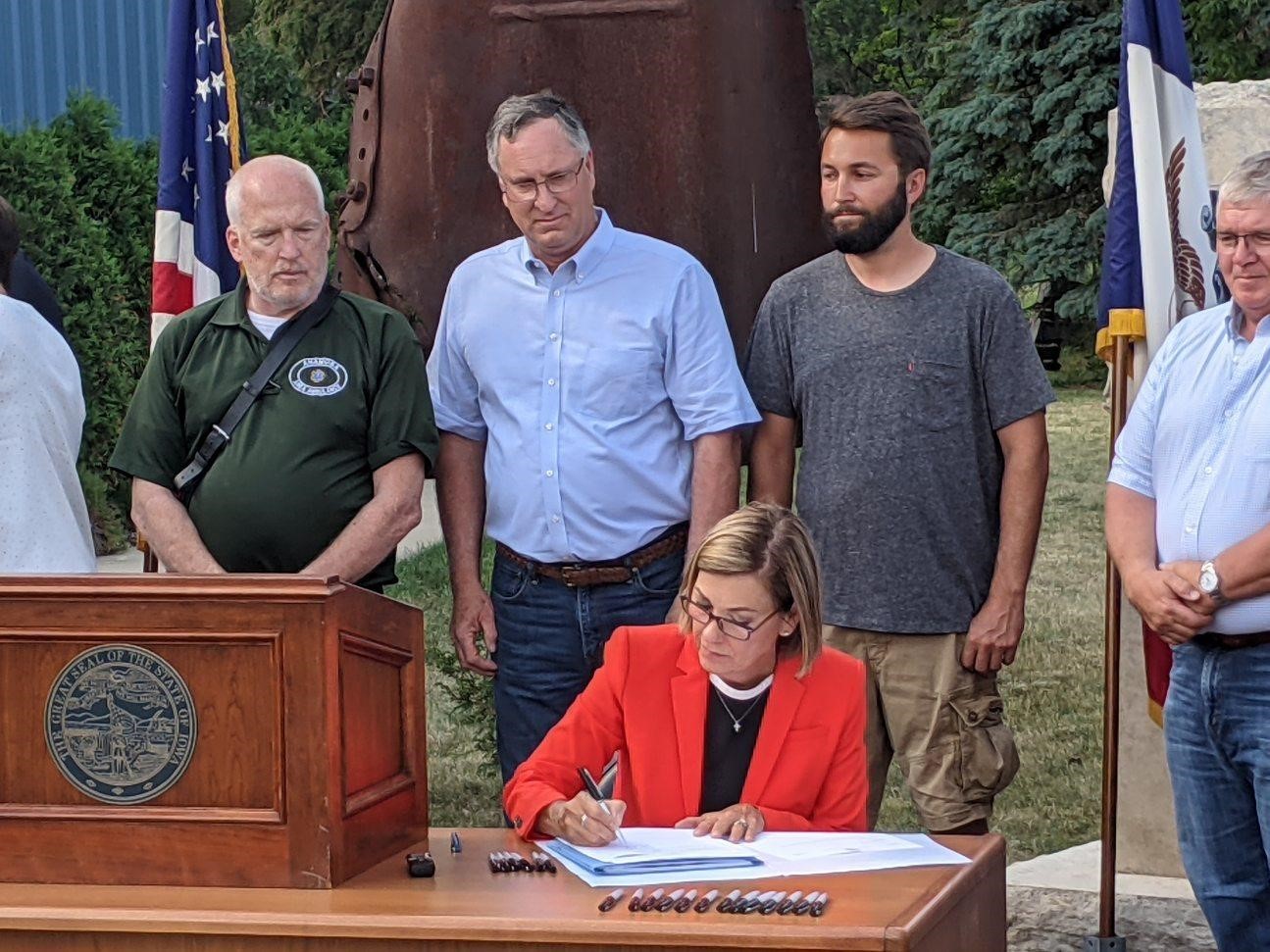Image: Iowa Governor Kim Reynolds (center, seated) signs Iowa Senate File 615 into law at the Monticello (IA) Ambulance Service facility, June 9, 2021. Image Source: Eric Briesemeister, UnityPoint Health – Jones Regional Medical Center.
The month of June marked the final steps in the state’s 2021 legislative session, with Iowa Governor Kim Reynolds reviewing the nearly 200 bills that were passed by the State House and Senate and sent to her for consideration. In all, 185 bills were signed into law by the governor, including a number of key health care policy and budget bills of impact to Iowans and supported by UnityPoint Health.
Key Health Care Policies and Legislation
Emergency Medical Services (EMS)
Standings Appropriations – Iowa Senate File 615
Status: Signed into law by Governor Reynolds on June 9, 2021.
On Wednesday, June 9, Iowa Governor Kim Reynolds signed into law the standing appropriations bill, of which includes language that streamlines the process for counties to adopt Emergency Medical Services (EMS) as an essential service.
“Throughout the pandemic, Iowa’s health care workers and our first responders were on the frontlines of our response day in and day out,” Gov. Reynolds said when signing the bill. “I think the pandemic shined an even brighter light on a growing issue in rural Iowa — the impact that limited EMS resources were having on small communities and…it was time to act.”
The bill creates a better-defined process for counties and its residents to plan for and implement long-term sustainable support for lifesaving EMS in its local communities, such as:
- Allows the establishment of a local advisory council to help review and guide EMS service operations.
- Allows counties or EMS districts to declare EMS an essential service through a vote of its residents.
- Allows counties or EMS districts provide funding of these services through a drawdown of tax levies through property tax or local income surtax if approved by the vote residents.
- Sets a sunset of the declaration of EMS services at 15 years for those counties that are not the 11 most-populous counties and 10 years for the most-populous counties.
For more information about the EMS legislation, please view a recent special issue of the Iowa Hospital Association Legislative Bulletin.
Health Care Workforce
As detailed in last month’s Iowa Update, two key health care workforce programs were expanded to support recruitment and retention efforts and were signed into law by the governor. These programs include the Rural Iowa Primary Care Loan Repayment Program (Senate File 129) and the Iowa Health Care Professional Recruitment Program (House File 196).
Health and Human Services (HHS) Appropriations
Health and Human Services Appropriations – Iowa House File 891
Status: Signed into law by Governor Reynolds on June 16.
As detailed in last month’s Iowa Update, the annual Health and Human Services (HHS) Appropriations bill that funds many health care and other related programs and services for Iowans, has since been signed into law by the governor. Aside from a change to certain pharmacy rates, Gov. Reynolds signed the bill into law with no additional changes. With that, when the new state Fiscal Year (FY) begins on July 1, a number of positive changes will be implemented to support existing programs and services across UnityPoint Health, such as the state’s Medicaid program, statewide Hospital Health Care Access Assessment, Child Advocacy/Protection Centers, Iowa Poison Control Center and the Medical Residency State Matching Grant Program, among others.
Mental Health Funding and Telehealth Payment Parity for Behavioral Health Services
Tax Omnibus – Iowa Senate File 619
Status: Signed into law by Governor Reynolds on June 16.
Following legislative advancements over the past several years to establish a children’s mental health system and to move toward fully-funding inpatient, outpatient, community-based and crisis services in Iowa’s 14 Mental Health and Disability Services (MHDS) regions, the legislature passed comprehensive mental health funding reform. Supported by Gov. Reynolds, the legislation will move from county property taxes to the state’s general fund. The shift in funding will occur over the next two years, while also enacting rules, requirements and a process for performance-contracts between the state and each of the MHDS regions.
Additionally, the bill ensures payment parity for mental health services offered through telehealth technology. Building upon legislation that was passed by the Iowa Legislature in 2015 and 2018 that formalized telehealth coverage under the state’s Medicaid program and commercial health insurance plans, this tax bill requires Iowa commercial health insurance plans to reimburse health care professionals and facilities for health care services for mental health conditions provided to a patients by telehealth on the same basis and at the same rate as the same services provided by the health care professional or facility in person.
Broadband
As shared the April Iowa Update, on April 28 Gov. Reynolds signed House File 848 into law. Passed unanimously by the Iowa legislature, the bill will soon award grants through the Empower Rural Iowa Broadband Grant Program to internet companies and providers that expand broadband in the state. Specific to funding, during the bill signing the governor announced that lawmakers have agreed to provide $100 million for the first year of the program and are reviewing the state’s ability to utilize federal stimulus dollars to provide additional funding.
For more information on State of Iowa advocacy, legislative, policy and regulatory issues of impact to UnityPoint Health, please contact Ashley Thompson, director of government & external affairs for UnityPoint Health.


